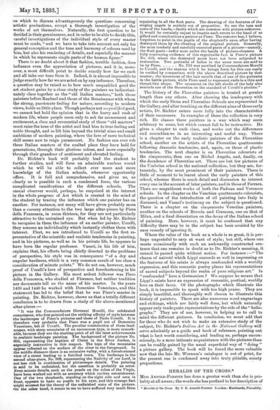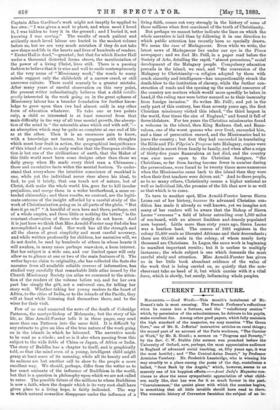HERALDS OF THE CROSS.*
Miss ARNOLD-FORSTER has done a greater work than she is pro- bably at all aware ; the words she has prefixed to her description of • Heralds of the Cross. By F. B. Arnold-Forster. London : Batobards, Piccadilly. Captain Allan Gardiner's work might not inaptly be applied to her o‘vn "I was given a seed to plant, and when most I loved it, I was bidden to bury it in the ground ; and I buried it, not knowing I was sowing." The results of much patient and evidently much loved labour are buried in the modest volume before us, but we are very much mistaken if they do not take new shape and life in the hearts and lives of hundreds of readers. " ExeterHall is dead,"—granted ; but that for which Exeter Hall under a. thousand distorted forms strove, the manifestation of the power of a living Christ, lives still. There is a passing fashion to believe that it is wise and well to smile contemptuously at the very name of "Missionary work," the words to many minds suggest only the shibboleth of a narrow creed, or still narrower cultnie. There could scarcely be a greater mistake. After many years of careful observation on this very point, the present writer unhesitatingly believes that a child intelli- gently interested in the work going on in the great spheres of Missionary labour has a broader foundation for further know- ledge to grow upon than (we had almost said) in any other form of education whatever. To take one or two points only, a child so interested is at least removed from that main difficulty in the way of all true mental growth, the absorp- tion of the mind in "the miserable aims which end with self,"— an absorption which may be quite as complete at one end of life as at the other. Then it is an enormous gain to know, with a knowledge not barren, but pregnant with thoughts which must bear fruit in action, the geographical insignificance of this island of ours, to early realise that the European civilisa- tion is but one of the civilisations of earth, that the Maker of this little world must have some designs other than those we daily grasp when He made every third man a Chinaman; these and co-relative facts widen the mental horizon. To under- stand that everywhere the intuitive conscience of mankind is one, while yet the individual never rises above his ideal, to find, to put it briefly, that one touch not of nature, but of Christ, cloth make the whole world kin, goes far to kill insular prejudices, and merge them in a wider brotherhood, a more ex- tended citizenship ; and these results, we contend, are the legiti- mate outcome of the insight afforded by a careful study of the work of Christianisation going on in all parts of the globe. 'But does it go on ?" "A handful of men here and there, perhaps, out of a whole empire, and these little or nothing the better," is the constant observation of those who simply do not know. And it is just here we think that Miss Arnold-Forster may find she has accomplished a good deal. Her work has aU the strength and all the charm of great simplicity and most careful accuracy, and while written professedly for children, her narrative will, we do not doubt, be read by hundreds of others in whose hearts it will awaken, in many cases perhaps reawaken, a keen interest. But her subject is a wide one, and our limited space will only allow us to glance at one or two of the main features of it. The writer lays no claim to originality, she has collected the facts she narrates from all available reliable sources of information, has studied very carefully that remarkable little atlas issued by the Church Missionary Society (an atlas we commend to the atten- tion of the readers of the volume before us), and for her own part has simply the gift, not a universal one, for telling her story well. Whether taking her young readers to the heart of Africa, to the cities of India, or to the islands of the Pacific, they will at least while listening find themselves there, and be the wiser for their visit.
Few of us read unmoved the news of the death of Coleridge Patteson, the martyr-bishop of Melanesia; but the story of his life, as Miss Arnold-Forster tells it in these pages, may send more than one Patteson into the same field. It is difficult by any extracts to give an idea of the true nature of the work going on in the islands in which he laboured. The narrative needs to be read as a whole ; and so is it also when. pa.ssing from this subject to the wide fields of China or Japan, of Africa or India. The story of Buddha has a chapter to itself, and is graphically told, so that the mind even, of a young, intelligent child might grasp at least some of its meaning, while all its beauty and all its sadness- are but another call to show to the people a more excellent way. We should, perhaps, differ from the writer as to her exact estimate of the influence of Buddhism in the world, but that is a question in philosophy upon which we are not called to enter. The possible future of the millions to whom Buddhism is now a faith, when the despair which is its very root shall have given place to a living hope, is fairly indicated. The way in which natural cowardice disappears under the influence of a
living faith, comes out very strongly in the history of some of these millions when first convinced of the truth of Christianity.
But perhaps we cannot better indicate the lines on which the whole narrative is laid than by following it in one direction to which public attention has recently been so specially. drawn. We mean the case of Madagascar. Even while we write, the latest news of Madagascar lies under our eye in the Times newspaper; and we find Mr. Peill, in a paper read before the Society of Arts, detailing the rapid, "almost precocious," social development of the Malagasy people. Compulsory education prevails in the island, we read, and "the conversion of the Malagasy to Christianity—a religion adopted by them with mach sincerity and intelligence—has unquestionably struck the to the institution of slavery, while the farther con- struction of roads and the opening up the material resources of the country are matters which would more speedily be taken in hand,if the ruling race were better assured as to their immunity from foreign invasion." So writes Mr. Peill ; and yet in the early part of this century, less than seventy years ago, the first Christian missionary visited this island, "the third largest in the world, four times the size of England," and found it fall of fierce idolators. For ten years the Christian missionaries found a welcome in the island, then King Radama died, and Rana- valona, one of the worst queens who ever lived, succeeded him, and a time of persecution ensued, and the Missionaries had leave the country ; but first they had succeeded in translating the Bible and The Pilgrim's Progress into Malagasy, copies were circulated in secret from family to family, and when after a reign of thirty-five years Ranavalona at last died, and the country was once more open to the Christian foreigner, "the Christians, so far from having become fewer in number during the persecutions, were found to be twenty times more numerous when the Missionaries came back to the island than they were when their first teachers were driven out." And to these people, as to so many others, Christianity means a higher national as well as individual life, the promise of the life that now is as well as that which is to come.
To turn to another spot, Miss Arnold-Forster leaves Sierra Leone out of her history, because its advanced Christian con- dition has made it already so well known, yet we imagine not many of her readers will be aware that the Bishop of Sierra Leone " oversees " a field of labour extending over 1,560 miles of sea-board, with an almost limitless and densely populated area beyond. Little more than sixty years ago, Sierra Leone was a heathen land. The census of 1881 registers in the colony 35,400 souls as liberated Africans and their descendants ; there are 60,546 souls in the colony, of whom nearly forty thousand are Christians. In Lagos, the same work is beginning to manifest important results ; but it is useless to multiply instances ; the whole subject is one which demands the most careful stud Y and attention. Miss Arnold-Forster has given us in her little book abundant evidence of the value of the work that is being carried on, so quietly that the non- observant take no heed of it, but which carries with it a vital force, which is slowly, but surely, influencing whole peoples.



































 Previous page
Previous page